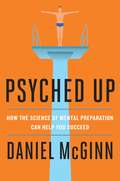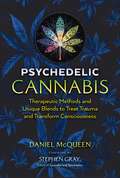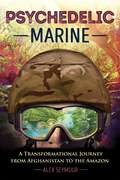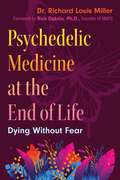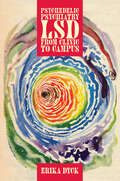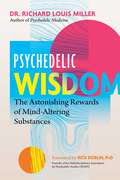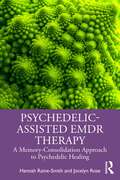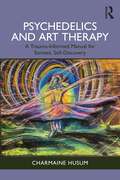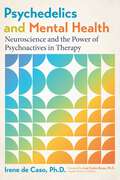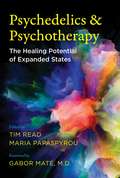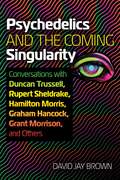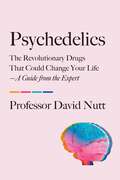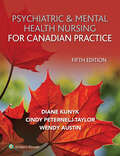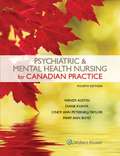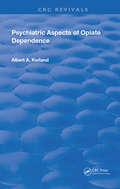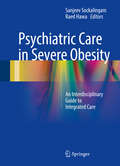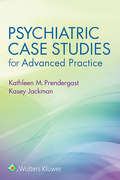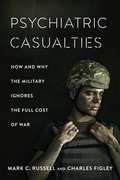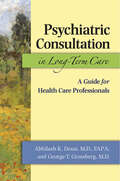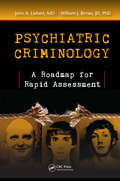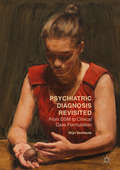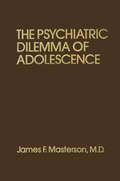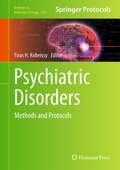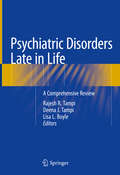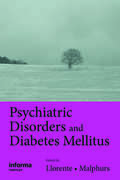- Table View
- List View
Psyched Up: How the Science of Mental Preparation Can Help You Succeed
by Daniel McginnClosing the sale. Asking for a raise. Nailing the big presentation. Of the 2,000 hours you work every year, your success or failure is determined in the couple of dozen crucial hours when you need to bring your absolute best. Will you?The last few minutes before a major challenge can be terrifying. Ever wished you knew how to make sure you ace the make-or-break test, audition, or interview?We often feel the most powerless just before we’re expected to act powerful. As you’ll learn in this life-changing book, practice might make perfect, but perfection is useless if you can’t summon it when it counts. Pulling off a great speech or the pivotal at bat also requires the right kind of mental preparation.In Psyched Up, journalist Daniel McGinn dives into the latest psychological research and interviews athletes, soldiers, entertainers, and others who, despite years of practice and enviable track records, will ultimately be judged on their ability to delivera solid performance when it’s their turn to shine. For instance, he reveals...• How Jerry Seinfeld’s jacket and Stephen Colbert’s pen help them get laughs.• What General Stanley McChrystal said to Special Forces before they entered the battlefield.• Why the New England Patriots hired the DJ from the Red Sox to help them win.Among other counterintuitive insights, McGinn reveals why trying to calm your backstage jitters can be worse for your performance than channeling it into excitement; how meaningless rituals can do more to prepare you in the final moments than last-minute rehearsal; and how a prescription from your doctor could help you unleash your best skills.Whether you’re a sportsperson or a salesperson, an actor or an entrepreneur, one bad hour can throw away months of hard work. There’s so much conflicting popular advice that we often end up doing the wrong things. McGinn separates the facts from the old wives’ tales and shares new, research driven strategies for activating your talent, optimizing your emotions, and getting psyched up to take the spotlight.
Psychedelic Cannabis: Therapeutic Methods and Unique Blends to Treat Trauma and Transform Consciousness
by Daniel McQueen• Explains how cannabis can be used to treat trauma and emotional pain, as a profound problem-solving tool, and as a potent catalyst for self-transformation and ongoing healing work • Shares methods to minimize the unwanted effects, such as intensified anxiety and paranoia, and direct the experience to produce deep physical relaxation and, when needed, elevated healing states • Details how to blend cannabis strains for specific kinds of psychedelic experiences and how to prepare for your sessions to ensure success Despite the recent resurgence of interest in the therapeutic potential of psychedelics, Cannabis sativa as a psychedelic therapy has been completely overlooked. Yet, as psychedelic specialist Daniel McQueen reveals, when used skillfully and with intention, cannabis can be used to treat trauma and other mental health concerns just as psilocybin mushrooms and MDMA can. It can also be used as a problem-solving tool and as a potent catalyst for self-actualization and ongoing healing work. Presenting a step-by-step guide, McQueen explores how to transform cannabis into a reliable and safe psychedelic medicine. Drawing on his years of experience working with clients to release traumas and emotional pain and step into their full potential, he explains the importance of proper dose, set, setting, and intention and details how to prepare for your psychedelic cannabis sessions to ensure success. He shares methods to use cannabis in a specialized and mindful way to minimize unwanted effects, such as intensified anxiety and paranoia, and direct the experience to produce vivid psychedelic states, deep physical relaxation, and healing. Looking at the unique qualities of di erent cannabis strains, the author explores the art of making a psychedelic cannabis blend, the possibilities and hidden potentials of each strain, and how to blend strains for specific medicine experiences, ranging in similarity to MDMA, psilocybin, and even ayahuasca. Unveiling new depth to this ancient spiritual and medicinal ally, McQueen shows how consciously using cannabis as a psychedelic can help transform your trauma into resilience and shift your mindset from surviving to thriving.
Psychedelic Marine: A Transformational Journey from Afghanistan to the Amazon
by Alex SeymourA vivid portrait of both the traumas of war and the shamanic healing ceremonies of ayahuasca• Explains how our culture lacks rites of passage and how shamanic ritual can fill this gap• Reveals how ayahuasca frees your consciousness from inherited beliefs, fears, and traumatic experience, allowing healing from PTSD, alcoholism, and addiction• Details the author’s experiences in Afghanistan, sailing on the Amazon river with a shaman, and the many ayahuasca ceremonies he experienced in the jungleAfter returning from a tour of duty during the war in Afghanistan, Alex Seymour needed a way to cope with the extremes he experienced as a member of the Royal Marine Commandos, losing 7 men in his unit, and having his best friend critically injured by a Taliban bomb. Drawing upon his pre-deployment experiences with DMT and psilocybin mushrooms, Alex knew that entheogens could help him release his fears and traumas. But he also knew that simply taking psychedelics wasn’t enough--he needed ceremony, something sacred to draw meaning from his experiences, to help him reassess not only the war and his role in it, but his entire life. So he set out for the Amazon in search of the hallucinogenic brew known as ayahuasca and a shaman to guide him. The result is a crazy, page-turning adventure where he journeys deep into the jungle and himself.Alex soon finds himself deep within the jungle on an incredible adventure, sailing on the Amazon river with an ayahuasca shaman and his troop of 8 female shamanas, whose ethereal songs help guide participants during the nightly ayahuasca ceremonies. Accompanied by others seeking wisdom and a redemptive experience from their First World professional lives, Alex finds his core beliefs fundamentally challenged, replaced by the power of direct experience of the sacred, which allows him to release his fears from the war and set an inspiring path for the future.Painting a vivid portrait of both the anguish of war and the transcendent world of shamanic ritual, the author shows how young people often enlist in the military to satisfy our human need for a rite of passage into adulthood, a ritual sorely missing in our culture. He explores how ayahuasca can offer a way to help soldiers prepare for war and help combat veterans heal from war and overcome PTSD--as well as alcoholism and addiction. From Afghanistan to the Amazon, the author shows how ayahuasca frees your consciousness from inherited beliefs and fears, offering a truly transformative rite of passage.
Psychedelic Medicine at the End of Life: Dying without Fear
by Dr. Richard Louis Miller• Outlines 10 steps for dying gracefully with the help of psychedelics, including how to navigate the complex legal landscape and find the right guide and therapy• Looks at clinical studies of psychedelics from UCLA, Johns Hopkins, and NYU School of Medicine that show dramatic lessening of end-of-life anxiety in terminally ill patients• Shares wisdom from experts on psychedelic research and palliative care, including Roland Griffiths, Katherine MacLean, Ira Byock, and Anthony BossisExamining the evolving landscape that is found around end-of-life psychedelic care, Dr. Richard Louis Miller, a clinical psychologist for more than half a century, looks at how LSD, MDMA, psilocybin, and ayahuasca can be vital tools in allowing individuals in all stages of life to confront fears of dying and, in so doing, lead richer lives.Miller shares wisdom from experts on the frontiers of psychedelic research and palliative care—including Roland Griffiths, Katherine MacLean, Ira Byock, and Anthony Bossis—and examines cutting-edge studies from Johns Hopkins, UCLA, and NYU School of Medicine that show dramatically decreased anxiety in terminally ill patients through the use of psychedelics. He explores how different substances can help the dying overcome their end-of-life distress. He also provides testimony from researchers and patients participating in psychedelic-assisted psychotherapy that helps convey the experience of ego death at the heart of the psychedelic experience.Miller outlines 10 steps for dying gracefully, without fear, with the help of psychedelics. He examines how to navigate the complex legal landscape and find the right guide, dose, and therapy. He also includes reflections from key figures in the psychedelic community as well as some of his own psychedelically informed mystical and near-death experiences.Revealing psychedelics as a portal of transformation, Miller shows how they are singularly valuable in helping individuals face the end of life with courage and serenity.
Psychedelic Psychiatry: LSD from Clinic to Campus
by Erika DyckLSD's short but colorful history in North America carries with it the distinct cachet of counterculture and government experimentation. The truth about this mind-altering chemical cocktail is far more complex—and less controversial—than generally believed. Psychedelic Psychiatry is the tale of medical researchers working to understand LSD’s therapeutic properties just as escalating anxieties about drug abuse in modern society laid the groundwork for the end of experimentation at the edge of psychopharmacology. Historian Erika Dyck deftly recasts our understanding of LSD to show it as an experimental substance, a medical treatment, and a tool for exploring psychotic perspectives—as well as a recreational drug. She recounts the inside story of the early days of LSD research in small-town, prairie Canada, when Humphry Osmond and Abram Hoffer claimed incredible advances in treating alcoholism, understanding schizophrenia and other psychoses, and achieving empathy with their patients. In relating the drug’s short, strange trip, Dyck explains how concerns about countercultural trends led to the criminalization of LSD and other so-called psychedelic drugs—concordantly opening the way for an explosion in legal prescription pharmaceuticals—and points to the recent re-emergence of sanctioned psychotropic research among psychiatric practitioners. This challenge to the prevailing wisdom behind drug regulation and addiction therapy provides a historical corrective to our perception of LSD’s medical efficacy.
Psychedelic Wisdom: The Astonishing Rewards of Mind-Altering Substances
by Dr. Richard Louis Miller• Reveals how these scientists, doctors, therapists, and teachers have applied their entheogenic experiences in their professions, leading to therapeutic advancements, scientific discoveries, and healing for thousands • Includes contributions from scientific psychonaut Amanda Feilding, psychedelic swami Dr. Allan Ajaya, &“America&’s Doctor&” Dean Edell, convicted psychiatrist Frederike Meckel Fisher, love doctor Charley Wininger, professor of psychedelics Thomas B. Roberts, ethnobotanical explorer Dennis McKenna, the &“Sunshine Makers&” Tim Scully and Michael Randall, as well as many others Over the past decade, many famous entrepreneurs and celebrities have begun to open up about their life-changing experiences with psychedelics that led to their personal successes. But less well-known are the wisdom-bringing psychedelic experiences of many top psychologists, psychiatrists, researchers, and others who have taken what they learned from their entheogenic experiences and applied it in their professions, leading to therapeutic advancements, scientific discoveries, and healing for thousands. In this profound book, Dr. Richard Louis Miller shares stories of psychedelic transformation, insight, and wisdom from his conversations with 19 scientists, doctors, therapists, and teachers, each of whom has been self-experimenting with psychedelic medicines, sub rosa, for decades. We hear from scientific psychonaut Amanda Feilding, founder of the Beckley Foundation; ethnobotanical explorer Dennis McKenna; research advocate and head of MAPS Rick Doblin; and the &“Sunshine Makers&”: Tim Scully, the scientist taught to make LSD by Owsley Stanley, and Michael Randall, the leader of the Brotherhood of Eternal Love. We learn about recasting &“bad trips&” as unfamiliar challenges from psychedelic swami Dr. Allan Ajaya, therapeutic uses of MDMA from &“the love doctor&” Charley Wininger, decades of insights from psychedelic professor Thomas B. Roberts, as well as several others. Revealing the psychedelic wisdom uncovered in spite of decades of the &“War on Drugs,&” Dr. Miller and his contributors show how LSD and other psychedelics offer a pathway to creativity, healing, innovation, and liberation.
Psychedelic-Assisted EMDR Therapy: A Memory-Consolidation Approach to Psychedelic Healing
by Hannah Raine-Smith Jocelyn RosePsychedelic-Assisted EMDR Therapy is a groundbreaking exploration of how eye movement desensitisation and reprocessing (EMDR) therapy can be harnessed to enhance the beneficial effects of psychedelic medications. EMDR is a clinically validated therapy that utilises bilateral stimulation of the brain to access and reconsolidate pathologically encoded memories. The protocolised methods outlined herein offer a practical roadmap for unlocking the full potential of EMDR within the context of psychedelic-assisted psychotherapies, paving the way for scalable psychedelic treatment options.Drawing upon a rich tapestry of research, case material and clinical insight, this book provides readers with a comprehensive understanding of how EMDR’s adaptive information processing (AIP) model conceptualises healing outcomes in psychedelic settings. Emphasising harm reduction, social justice and sustainability, this book systematically outlines a strong focus for the work, to ensure safer, more inclusive, equitable, environmentally conscious practices in psychedelic therapy delivery.Authored by experts in the field, this is a compelling resource that expands the horizon of contemporary psychedelic psychotherapy, offering a novel perspective and a confident new voice in trauma-responsive healing.
Psychedelics and Art Therapy: A Trauma-Informed Manual for Somatic Self-Discovery
by Charmaine HusumThis book serves as a vital resource for clinicians, therapists, and individuals aiming to integrate their psychedelic experiences through the transformative practice of Art Therapy. Rooted in a Trauma‑informed approach, Psychedelics and Art Therapy: A Trauma‑Informed Manual for Somatic Self Discovery offers guidance on navigating the profound psychological and emotional shifts that often accompany such journeys.This book combines creative exercises with meditation and neuroscientific insights to show how Art Therapy can effectively reroute neural pathways, fostering sustained emotional well‑being and personal growth. In an era where the underground market of psychedelic therapy is often unsafe and commercially driven, this book advocates for a sustainable approach to healing that prevents habitual reliance on these substances. Authored by an Art Therapist with over a decade of specialized experience in psychedelic preparation and integration, this book transcends the underground stigmas associated with drug culture, offering a trusted path to healing grounded in therapeutic practices that honor transpersonal and Indigenous wisdom.As the conversation around Psychedelics in therapy evolves, this essential guide provides a structured and compassionate approach to integration and healing, ensuring long‑term personal empowerment and inner well‑being.
Psychedelics and Mental Health: Neuroscience and the Power of Psychoactives in Therapy
by Irene de Caso• Details how psychedelics alter our experience from a neurological perspective, including what neurons they interact with, their effects on cognitive and emotional processing, and why those effects can be therapeutic• Looks at clinical results with LSD, psilocybin from magic mushrooms, and DMT from ayahuasca, as well as empathogens such as MDMA, found in ecstasy• Provides an illustrated introduction to neuroscience and a vision for a new model of psychotherapy where psychedelics help bring lasting healingPresenting a comprehensive guide to the new and evolving landscape of psychedelic-assisted mental health treatment, neuroscientist Irene de Caso takes you on a journey through the brain, revealing how psychedelics and empathogens, if taken in a safe and therapeutic environment, can lead to positive and lasting changes.Providing an illustrated introduction to neuroscience and molecular actions in the body and brain, the author details how psychedelics alter our experience, including their effects on cognitive and emotional processing and how those effects can be therapeutic. She explores the wide body of evidence behind the psychedelic revolution in psychiatry and psychotherapy and looks at clinical studies on hallucinogens such as LSD, psilocybin from magic mushrooms, and DMT from ayahuasca as well as empathogens such as MDMA found in ecstasy. She reviews the efficacy of psychedelics in treating alcoholism and other addictions, post-traumatic stress disorder, social anxiety in autistic individuals, treatment-resistant depression, and other conditions, offering statistical comparisons to conventional antidepressants and mood-enhancing drugs. She also explores the psychedelic experience through neuroimaging and phenomenological experience, considering mystical states, synesthesia, and the therapeutic benefits of momentary ego-dissolution.Laying the foundation for a new model of psychotherapy, de Caso shows how psychedelics can help break down our defense mechanisms, offer direct access to the subconscious, and provide a path to deeper, lasting healing.
Psychedelics and Psychotherapy: The Healing Potential of Expanded States
by Tim Read and Maria Papaspyrou• Examines the therapeutic potential of expanded states, underground psychedelic psychotherapy, harm reduction, new approaches for healing individual and collective trauma, and training considerations • Addresses challenging psychedelic experiences, spiritual emergencies, and the central importance of the therapeutic relationship • Details the use of cannabis as a psychedelic tool, spiritual exploration with LSD, micro-dosing with Iboga, and MDMA-assisted psychotherapy for PTSD Exploring the latest developments in the flourishing field of modern psychedelic psycho-therapy, this book shares practical experiences and insights from both elders and newer research voices in the psychedelic research and clinical communities. The contributors examine new findings on safe and skillful work with psychedelic and expanded states for therapeutic, personal, and spiritual growth. They explain the dual process of opening and healing. They explore new approaches for individual inner work as well as for the healing of ancestral and collective trauma. They examine the power of expanded states for reparative attachment work and offer insights on the integration process through the lens of Holotropic Breathwork. The contributors also examine the use of cannabis as a psychedelic tool, spiritual exploration with LSD, microdosing with Iboga, treating depression with psilocybin, and MDMA-assisted psychotherapy for PTSD. Revealing diverse ways of working with psychedelics in terms of set, setting, and type of substance, the book concludes with discussions of ethics and professional development for those working in the field as well as explores considerations for training the next generation of psychedelic therapists.
Psychedelics and the Coming Singularity: Conversations with Duncan Trussell, Rupert Sheldrake, Hamilton Morris, Graham Hancock, Grant Morrison, and Others
by David Jay Brown• Includes conversations with Duncan Trussell, Graham Hancock, Grant Morrison, Hamilton Morris, Erik Davis, Julia Mossbridge, Rupert Sheldrake, and others• Explores the possibility of human extinction, Simulation Theory, Virtual Reality and lucid dreaming, space migration, DMT research, and advanced robotics• Delves deep into the relationship between psychedelics and ecological awarenessBetween war, inequality, biosphere collapse, climate change, and destabilizing advances in technology like AI, humankind is confronted with an almost insurmountable array of challenges. Yet many brilliant experts are working on outside-the-box solutions, looking to psychedelic-inspired visions of the future to lead humanity through these crises.In a series of conversations with leading minds in consciousness studies, psychedelic culture, anthropology, chemistry, and other disciplines, author David Jay Brown elicits answers to some of the most thought-provoking questions about our origins, our present situation, and the future of humanity and the Earth. Brown and these luminaries explore topics as diverse as potential human extinction, the relationship between psychedelics and ecological consciousness, simulation theory, virtual reality and lucid dreaming, the consciousness-altering effects of the pandemic, space migration and contact with alien intelligence, and DMT research and advanced robotics.Whether he&’s speaking to podcaster Duncan Trussell about the Singularity, comic book author Grant Morrison about magick and the occult, or neuroscientist Julia Mossbridge about psychic phenomena, Brown&’s spirited interview approach helps draw profound insights from these cutting-edge thinkers. What, he asks, are the implications of our understanding of consciousness, particularly altered states—and how might entheogens help raise ecological awareness to impact the future of our species? In this curated colletion of interviews, Brown seeks to find out.
Psychedelics: The Revolutionary Drugs That Could Change Your Life—A Guide from the Expert
by Professor David NuttThe definitive guide to the science of psychedelics—"the perfect intro for anyone curious about psychedelics and MDMA&” (Ethan Nadelmann, founder and former executive director, Drug Policy Alliance)--and how they can impact our health by world-renowned, leading authority Professor David Nutt. We are on the cusp of a major revolution in psychiatric medicine and neuroscience. After fifty years of prohibition, criminalization and fear, science is finally showing us that psychedelics are not dangerous or harmful. Instead, when used according to tested, safe and ethical guidelines, they are our most powerful newest treatment of mental health conditions, from depression, PTSD, and OCD to disordered eating and even addiction and chronic pain. Professor David Nutt, one of the world's leading Neuropsychopharmacologists, has spent 15 years researching this field and it is his most significant body of work to date. In 2018, he co-founded the first academic psychedelic research center - underpinned by his mission to provide evidence-based information for people everywhere. It revived interest in the understanding and use of this drug in its many forms, including MDMA, ayahuasca, magic mushrooms, LSD and ketamine. The results of this have been nothing short of ground-breaking for the future categorization of drugs, but also for what we now know about brain mechanisms and our consciousness. At a time where there is an enormous amount of noise around the benefits of psychedelics, this book contains the knowledge you need to know about a drug that is about to go mainstream, free from the hot air, direct from the expert. Are you ready to change your mind?
Psychiatric & Mental Health Nursing for Canadian Practice
by Mary Ann Boyd Wendy Austin Cindy Ann Peternelj-Taylor Diane KunykThoroughly written, extensively updated, and optimized for today’s evolving Canadian healthcare environment, Psychiatric & Mental Health Nursing for Canadian Practice, 5th Edition, equips students with the fundamental knowledge and skills to effectively care for diverse populations in mental health nursing practice. This proven, approachable text instills a generalist-level mastery of mental health promotion, assessment, and interventions in adults, families, children, adolescents, and older adults, delivering Canadian students the preparation they need to excel on the NCLEX® exam and make a confident transition to clinical practice.
Psychiatric & Mental Health Nursing for Canadian Practice (M - Medicine Ser.)
by Mary Ann Boyd Wendy Austin Cindy Ann Peternelj-Taylor Diane KunykMeet the challenges of mental health nursing—in Canada and around the world. Optimized for the unique challenges of Canadian health care and thoroughly revised to reflect the changing field of mental health, Psychiatric & Mental Health Nursing for Canadian Practice, 4th Edition, is your key to a generalist-level mastery of fundamental knowledge and skills in mental health nursing. Gain the knowledge you need to deliver quality psychiatric and mental health nursing care to a diverse population. • Discover the biological foundations of psychiatric disorders and master mental health promotion, assessment, and interventions for patients at every age. • Explore current research and key topics as you prepare for the unique realities of Canadian clinical practice. • Gain a deeper understanding of the historical trauma of Aboriginal peoples and its implications for nursing care. • Online Video Series, Lippincott Theory to Practice Video Series: Psychiatric-Mental Health Nursing includes videos of true-to-life patients displaying mental health disorders, allowing students to gain experience and a deeper understanding of mental health patients.
Psychiatric Aspects of Opiate Dependence (Routledge Revivals)
by Albert A. KurlandFirst published in 1978: This book discusses the Psychiatric effects of Opiate dependence.
Psychiatric Care in Severe Obesity
by Sanjeev Sockalingam Raed HawaThis book is designed to present a comprehensive, state-of the-art approach to assessing and managing bariatric surgery and psychosocial care. Unlike any other text, this book focuses on developing a biopsychosocial understanding of patients' obesity journey and psychosocial factors contributing to their obesity and its management from an integrated perspective. Psychiatric Care in Severe Obesity takes a 360 approach by covering the disease's prevalence and relationship to psychiatric illness and social factors, including genetics, neurohormonal pathways and development factors for obesity. This book presents evidence and strategies for assessing psychiatric issues in severe obesity and uses common psychiatric presentations to feature the impact on bariatric surgery and key assessment features for weight loss. Concluding chapters focus on evidence-based psychosocial treatments for supporting patients with weight loss and bariatric surgery and includes educational tools and checklists for assessment, treatment, and care. Experts on non-pharmacological interventions such as mindfulness, cognitive-behavioral therapy and nutrition education describe treatment approaches in each modality, concluding with pharmacological approaches for psychiatric conditions and eating pathology. Additional tools in the appendices support clinicians, making this the ultimate guide for managing psychiatric illness in patients suffering from severe obesity. As obesity continues to grow in prevalence as a medically recognized epidemic, Psychiatric Care in Severe Obesity serves a vital resource to medical students, psychiatrists, psychologists, bariatric surgeons, primary care physicians, dietitians, mental health nurses, social workers, and all medical professionals working with severely obese patients.
Psychiatric Case Studies for Advanced Practice
by Kathleen PrendergastGet much-needed exposure to real-world clinical scenarios and psychiatric evaluations, with this invaluable guide to positive, effective psychiatric advance practice nursing care. For an expert guide to providing patient-centered, evidence-based psychiatric care, keep Psychiatric Case Studies for Advanced Practice by your side. Practical and easy-to-follow, these more than 50 case scenarios clearly display the complaints, diagnoses, and treatments of the most common psychiatric disorders, supporting the critical decision-making skills of nurses practicing in a broad range of settings. Psychiatric, family, emergency, and general practice nurse practitioners of all experience levels will find this an invaluable aid for creating an informed, holistic practice. Follow the real-life cases and expert analysis of psychiatric patients of a wide variety of ages, backgrounds, and conditions . . . Real-world child, adolescent, adult, and geriatric inpatient and outpatient psychiatric case studies that emphasize problem-based learning and an evidence-based practice Current diagnostic content from the Diagnostic and Statistical Manual of Mental Disorders, 5th Edition (DSM-5), that includes DSM-5’s newer diagnoses—gender dysphoria, binge eating disorder, and autism spectrum, plus current treatments for alcohol and opiate addiction Sample routine screening tools that offer convenient checklists and handouts to support patient treatment Content presented in a simple format—organized by age and indexed by diagnostic category for quick reference Each case presented in a standard format: chief complaint, history, mental status, diagnosis, differential diagnosis, treatment plan, and rationale for treatment prescribed—with questions at the end that guide you to create a diagnosis using the DSM-5 Cases addressing a wide range of disorders and supporting all experience levels in a variety of treatment settings—counseling centers, correctional facilities, homeless shelters, inpatient psychiatric units, and hospital consultation and liaison services Treatments and rationales that represent current, evidence-based research—treatment sections divided into psychopharmacology, diagnostic tests, referral, psychotherapy, and psychoeducatio Supplemental teaching tool for graduate psychiatric nurse practitioner/APN programs
Psychiatric Casualties: How and Why the Military Ignores the Full Cost of War
by Professor Mark Russell Professor Charles FigleyThe psychological toll of war is vast, and the social costs of war’s psychiatric casualties extend even further. Yet military mental health care suffers from extensive waiting lists, organizational scandals, spikes in veteran suicide, narcotic overprescription, shortages of mental health professionals, and inadequate treatment. The prevalence of conditions such as post–traumatic stress disorder is often underestimated, and there remains entrenched stigma and fear of being diagnosed. Even more alarming is how the military dismisses or conceals the significance and extent of the mental health crisis.The trauma experts Mark C. Russell and Charles Figley offer an impassioned and meticulous critique of the systemic failures in military mental health care in the United States. They examine the persistent disconnect between war culture, which valorizes an appearance of strength and seeks to purge weakness, and the science and treatment of trauma. Instead of reckoning with the mental health crisis, the military has neglected the needs of service members. It has discharged, prosecuted, and incarcerated a large number of people struggling with the psychological realities of war, and it has inflicted humiliation, ridicule, and shame on many more. Through a far-reaching historical account, Russell and Figley detail how the military has perpetuated a self-inflicted crisis. The book concludes with actionable prescriptions for change and a comprehensive approach to significantly improving military mental health.
Psychiatric Consultation in Long-Term Care: A Guide for Health Care Professionals
by George T. Grossberg Abhilash K. DesaiStudies show that residents of nursing homes and assisted living facilities are at a substantial risk of having psychiatric disorders. This practical volume provides much-needed clinical guidance for the prevention and appropriate treatment of mental illness in long-term care settings.Abhilash K. Desai and George T. Grossberg offer a basic framework for a humanistic, team-based approach to meeting the needs of elder persons with mental disorders in long-term care facilities. Early chapters cover the demographics of residents, the epidemiology of their psychiatric symptoms, and the assessment process. Subsequent chapters focus on major disorders, including dementia, delirium, depression, psychosis, and anxiety. The authors discuss end-of-life issues and treatments and offer suggestions for improving care. Throughout, they highlight the importance of the relationship between staff and residents.Emphasizing creative engagement and hands-on care and featuring clinical vignettes and practical tips, this optimistic volume reinforces the potential for nursing homes and assisted living facilities to be communities where residents thrive.
Psychiatric Criminology: A Roadmap for Rapid Assessment
by John A. Liebert, MD William J. Birnes, JD, PhDSince the shutdown of our public psychiatry system, the seriously mentally ill are now mostly managed by public safety officers, school officials, emergency first responders and social workers with little experience in recognizing symptoms, triggers and issues. This book addresses the need to recognize the psychiatric component of criminological issues and the methodology of dealing with it on a practical as well as academic basis. It provides a roadmap for training in rapid assessment built on evidence-based emergency psychiatry protocols.
Psychiatric Diagnosis Revisited
by Stijn VanheuleThis book explores the purpose of clinical psychological and psychiatric diagnosis, and provides a persuasive case for moving away from the traditional practice of psychiatric classification. It discusses the validity and reliability of classification-based approaches to clinical diagnosis, and frames them in their broader historical and societal context. The Diagnostic and Statistical Manual of Mental Disorders (DSM) is used across the world in research and a range of mental health settings; here, Stijn Vanheule argues that the diagnostic reliability of the DSM is overrated, built on a limited biomedical approach to mental disorders that neglects context, and ultimately breeds stigma. The book subsequently makes a passionate plea for a more detailed approach to the study of mental suffering by means of case formulation. Starting from literature on qualitative research the author makes clear how to guarantee the quality of clinical case formulations.
Psychiatric Dilemma Of Adolescence
by James F. Masterson, M.D.This volume was first published in 1967 with an initial reissue in 1984. It is addressed to students of adolescent psychopathology in general and to students of the borderline and narcissistic personality disorders in particular. It was the first systematic research to challenge and place in perspective the then prevalent "adolescent turmoil" theory: the growth process of adolescence was producing symptoms which would subside as the patient grew older. This view had led to a tendency to deny the seriousness of psychopathology and, therefore, to postpone necessary treatment.
Psychiatric Disorders
by Firas H. KobeissyNew high throughput techniques in neuroscience and psychiatry have enhanced the development of experimental, customizable animal models that are predictive of human neuropsychiatric pathology and give vital insights on the mechanisms and pathways involved. In Psychiatric Disorders: Methods and Protocols, key experts have written integrated chapters on neuropsychiatric research sharing their insightful expertise and opinions focusing on both the animal models as well as the cutting edge techniques applied. Beginning with an overview of the animal research in psychiatric illness and substance abuse, this comprehensive volume continues with the modeling of neuropsychiatric illness, drug abuse paradigms and techniques, biomarker identification, autoimmune inflammatory response, and neuroendocrine alteration in the areas of psychiatry, as well as state-of-the-art "Omics approaches" and neurosystems biology/data mining techniques to compute and analyze genomic and proteomics alteration occurring within neuropsychiatric models. As a part of the highly successful Methods in Molecular BiologyTM series, chapters include introductions to their respective topics, lists of the necessary materials and reagents, step-by-step, readily reproducible laboratory protocols, and tips on troubleshooting and avoiding known pitfalls. Thorough and easily applicable, Psychiatric Disorders: Methods and Protocols offers the detailed and clearly illustrated tools necessary for neuroscientists and psychiatrists to handle many unanswered scientific questions with a more creative and insightful approach.
Psychiatric Disorders Late in Life: A Comprehensive Review
by Rajesh R. Tampi Deena J. Tampi Lisa L. BoyleThough mental health recommendations for the elderly is rapidly evolving, the few current textbooks on this subject are either too voluminous or complex for regular review by clinicians, and most do not contain the latest information available in the field. Written by experts in geriatric psychiatry, this book provides a comprehensive yet concise review of the subject.The text covers topics that include the social aspect of aging, treatment and diagnosis options unique to the elderly in need of psychiatric care, policy and ethics, and particular geriatric health concerns that may influence psychiatric considerations.Psychiatric Disorders Late in Life is the ultimate resource for practicing psychiatrists, physicians, geriatricians, and medical students concerned with the mental healthcare of the elderly.
Psychiatric Disorders and Diabetes Mellitus
by Maria D Llorente Julie E MalphursDiabetes mellitus is a disease that affects millions of people and their families worldwide, and is increasingly recognized to be a growing public health problem among industrialized nations. Diabetes has been associated with a variety of co-occurring conditions, including cardiovascular disease, elevated lipid serum levels, and more recently, a va
